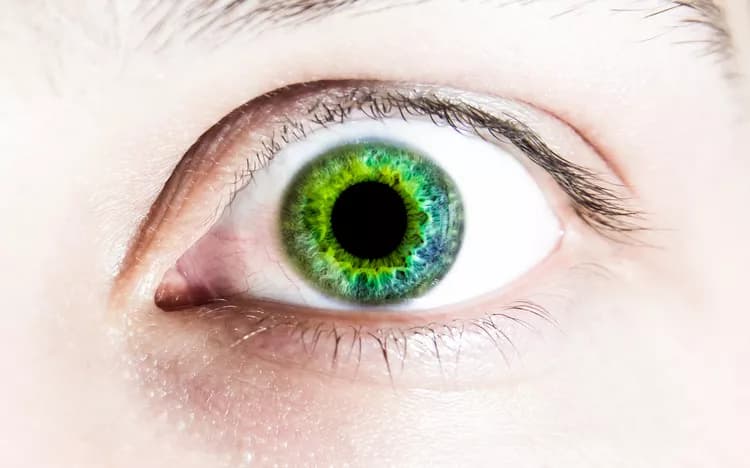
Increased Eye Cancer Risk Linked To Pigmentation Genes That Dictate Eye Color
New research links specific inherited genetic differences (alterations) to an increased risk for eye (uveal) melanoma, a rare form of melanoma that arises from pigment cells that determine eye color.
Roughly 2,500 people are diagnosed with uveal melanoma in the United States annually. Previous clinical data suggests uveal melanoma is more common in Caucasians and individuals with light eye coloration; however, the genetic mechanisms underlying this cancer's development were largely unknown.
In this new study -- co-authored by ophthalmologic pathologist and cancer geneticist Mohamed Abdel-Rahman, MD, PhD, of The Ohio State University Comprehensive Cancer Center -- Arthur G. James Cancer Hospital and Richard J. Solove Research Institute and cancer geneticist Tomas Kirchhoff, PhD, of the Perlmutter Cancer Center of NYU School of Medicine -- scientists report the first evidence of a strong association between genes linked to eye color and development of uveal melanoma.
Reported data suggests that inherited genetic factors associated with eye and skin pigmentation could increase a person's risk for uveal melanoma.
Abdel-Rahman, Kirchhoff and team report their findings in the medical journal Scientific Reports.
"This is a very important discovery that will guide future research efforts to explore the interactions of these pigmentary genes with other genetic and environmental risk factors in cancers not linked to sun exposure, such as eye melanoma. This could provide a paradigm shift in the field. Our study suggests that in eye melanoma the pigmentation difference may play a direct cancer-driving role, not related to sunlight protection," says Abdel-Rahman.
Unlike other solid tumors, there has been limited progress in understanding the contribution of genetic risk factors to the development of uveal melanoma, researchers say, primarily due to the absence of comprehensive genetic data from patients as the large sample cohorts for this rare cancer type have not been available for research.
To overcome these limitations, researchers analyzed samples from more than 270 patients with uveal melanoma, most of whom were treated at Ohio State.
Because there is a known clinical connection between eye melanoma and skin cancer, in this study researchers sought to determine whether there were commonly shared genetic factors between both diseases, as the inherited genetic risk of skin melanoma has been more extensively explored in previous medical literature.
The team analyzed 29 inherited genetic mutations previously linked with skin melanoma to determine if there was an associated risk of uveal melanoma.
This analysis revealed that five genetic mutations were significantly associated with uveal melanoma risk. The three most significant genetic associations occurred in a genetic region that determines eye color.
"Genetic susceptibility to uveal melanoma has been traditionally thought to be restricted only to a small groups of patients with family history. Now our strong data shows the presence of novel genetic risk factors associated with this disease in a general population of uveal melanoma patients," says Kirchhoff. "But this data is also important because it indicates -- for the first time -- that there is a shared genetic susceptibility to both skin and uveal melanoma mediated by genetic determination of eye color. This knowledge may have direct implications in the deeper molecular understanding of both diseases," adds Kirchhoff.
Researchers expect the data presented in this study to fuel the formation of large national and international research consortiums to conduct comprehensive, systematic analysis of inherited (germline) genome data in large cohorts of uveal melanoma patients.
"This type of collaboration is critically needed to dissect additional modifying genetic risk factors that may be uveal melanoma specific. This has important consequences not only for the prevention or early diagnosis of the disease but potentially for more improved therapies for at-risk patients," says Kirchhoff.
"Federal funding will be crucial to support research of rare cancers such as eye melanoma as it is likely, as shown in this study, that the impact of such research will extend across the different cancer types," adds Abdel-Rahman.
The above post is reprinted from materials provided by Ohio State University Wexner Medical Center. Note: Content may be edited for style and length.
Disclaimer: DoveMed is not responsible for the adapted accuracy of news releases posted to DoveMed by contributing universities and institutions.
Primary Resource:
Ferguson, R., Vogelsang, M., Ucisik-Akkaya, E., Rai, K., Pilarski, R., Martinez, C. N., ... & Klein, R. J. (2016). Genetic markers of pigmentation are novel risk loci for uveal melanoma. Scientific Reports, 6.
Related Articles
Test Your Knowledge
Asked by users
Related Centers
Related Specialties
Related Physicians
Related Procedures
Related Resources
Join DoveHubs
and connect with fellow professionals

0 Comments
Please log in to post a comment.